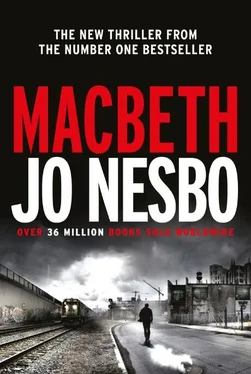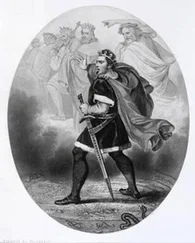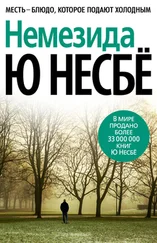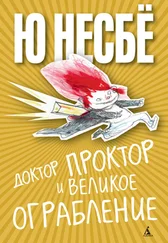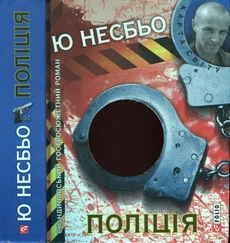‘Take it off,’ he said.
She laughed. ‘I’ve just put it on.’
‘It’s an order. Stay where you are and take it off. Slowly.’
‘Hm. Maybe. If I’m given a clearer order...’
‘Caithness, you are hereby ordered by a superior officer to turn your back, pull what you’re wearing over your head, lean forward and take a good hold of the door frame.’
Duff heard her little girlie gasp of shock. Perhaps it was put on for his sake, perhaps not. It was fine by him. He was getting in the mood.
Hecate strode across the damp floor of the central station, between the peeling walls and mumbling drug addicts. He noticed the gaze of two guys stooped over a spoon and syringe they were obviously sharing. They didn’t know him. No one knew him. Perhaps they were thinking the big man with the mustard-yellow cashmere coat, the carefully groomed, almost unnaturally black hair and the resplendent heavy Rolex looked like perfect prey which had just walked into the lion’s den. Or they may have had suspicions; perhaps there was something about the self-assured, determined gait, something about the gold-capped walking stick, which made a rhythmic tick-tock in time with the stiletto heels of the tall broad-shouldered woman who walked two steps behind him. If she was a woman. There might also have been something about the three men, all wearing grey lightweight coats, who had entered the station immediately before him and taken up a position by the wall. Perhaps that was why they sensed that they were in his den. He was the lion.
Hecate stopped, and let Strega go first down the narrow stairs reeking of urine to the toilet. Saw the two druggies lower their heads and concentrate on the task in hand — heating and injecting. Addicts. For Hecate this was a statement of fact without contempt or irritation. After all, they were his bread and butter.
Strega opened the door at the bottom of the stairs, lifted a sleeping man to his feet, bared her teeth to show him her mood and a thumb to point him in the right direction. Hecate followed her in between the cubicles and the running sinks. The stench was so intense that Hecate could still get tears in his eyes. But it also had a function: it kept away curious eyes and made even the hardened addicts keep their visits as brief as possible. Strega and Hecate went into the furthest cubicle with the sign DO NOT USE on the door and a bowl filled to the brim with excrement. Furthermore, the neon tube in the ceiling above had been removed, so it was impossible to see or hit veins in there. Strega removed one of the tiles above the disconnected loo, turned a handle and pushed. The wall swung open, and they stepped inside.
‘Close it quickly,’ Hecate said and coughed. He looked around the room. It had been a railway storeroom, and the other door led to the tunnel for the southern lines. He had moved his production here two years after the train traffic had ceased. He’d had to chase out some tramps and junkies, and although no one ever came here and Chief Commissioner Kenneth had been their highest-ranking protector he had installed camouflaged CCTV in the tunnel and over the stairs down to the toilet. There were twelve people in total on the evening shift, all wearing masks and white coats. On this side of the glass partition dividing the room into two, brew was chopped up, weighed and packed into plastic bags by seven people. By the tunnel door sat two armed guards keeping an eye on the workers and the CCTV monitors. Inside the glass partition was what they called the inner sanctum or simply the kitchen. The tank was there, and only the sisters had access. The kitchen was hermetically sealed for many reasons. First, so that nothing outside could contaminate the processes inside and because some idiot might inadvertently flick a lighter or throw down a lit cigarette end, blowing them all to pieces. But mostly because everyone in the room would soon be hooked if they inhaled the molecules floating in the air on a daily basis.
Hecate had found the sisters in a Chinatown opium den in Bangkok, where the two had set up a home-made laboratory to make heroin from the opium in Chang Rai. He didn’t know much about them, only that they had fled China with Chiang Kai-shek’s people, the disease that had ravaged their faces had reportedly spread through the village they came from, and as long as he paid them punctually they would deliver whatever he asked. The ingredients were well known, the proportions the same, and others could follow the procedures through the glass window. Yet there was a mystery about the way they mixed and heated the ingredients. And Hecate saw no reason to deny the rumours that they used toads’ glands, bumble bee wings, juice from rats’ tails and even blew their noses into the tank. It created a sense of black magic, and if there was something that people would pay for in their all-too-real working lives, it was precisely that: black magic. And brew was going down a bomb. Hecate had never seen so many become so desperately addicted in such a short time. But it was equally obvious that the day the sisters produced a slightly less potent product he would have to get rid of them. That was how it was. Everything had its day, its cycle. Like the two decades under Kenneth. The good times. And now with Duncan, who if he was allowed to go his merry way would mean bad times for the magic industry. It is obvious that if the gods bring good and bad times, short human lives and death, you have to make sure you become a god yourself. It is easier than you might think. The obstacle to most people achieving god-like status is that they are afraid and superstitious, and in their anxiety-ridden submission they believe there is a morality, a set of heaven-sent rules that apply to all people. But these rules are made by precisely those that tell you they are gods, and in some strange way the rules serve these gods. Well, OK, not everyone can be a god, and every god needs followers, a client base. A market. A town. Many towns.
Hecate took up a position at the end of the room, placed both hands on the top of his stick and just stood there. This was his factory. Here he was the factory owner. In a growing industry. He would soon have to expand. If he didn’t meet the demand others would, those were the simple rules of capitalism. He’d long had plans to take over one of the town’s disused factories, set up some fictitious business as a cover while he concocted his brew in the back rooms. Guards, barbed-wire fences, his own lorries going in and out. He could increase production tenfold and export to the rest of the country. But it would be more visible and would require police protection. It would require a chief commissioner who was in his pocket. It would require a Kenneth. So what do you do if Kenneth is dead? You make a new one and clear a path for him.
He received stiff smiles and brief nods from his choppers and packers before they launched themselves at their tasks with renewed energy. They were frightened. That was the principal purpose of these inspections. Not to stop the cycle — it was inevitable — but to delay it. Everyone in this cellar room would at some point try to cheat him, take a few grams home and sell it themselves. They would be found out, and the sentence would be carried out speedily. By Strega. She seemed to enjoy her varied assignments. Like being a messenger together with the sisters.
‘Well, Strega,’ he said. ‘Do you think the seed we sowed in Macbeth will grow?’
‘Human ambition will always stretch towards the sun like a thistle and overshadow and kill everything around it.’
‘Let’s hope so.’
‘They’re thistles. They can’t help themselves. They’re evil and foolish. If people see the soothsayer’s first prophecy fulfilled they’ll believe the next one blindly. And now Macbeth has found out he’s the new head of Organised Crime. The only question is whether Macbeth has enough of the thistle’s ambition in him. And the necessary cruelty to go the whole way.’
Читать дальше
